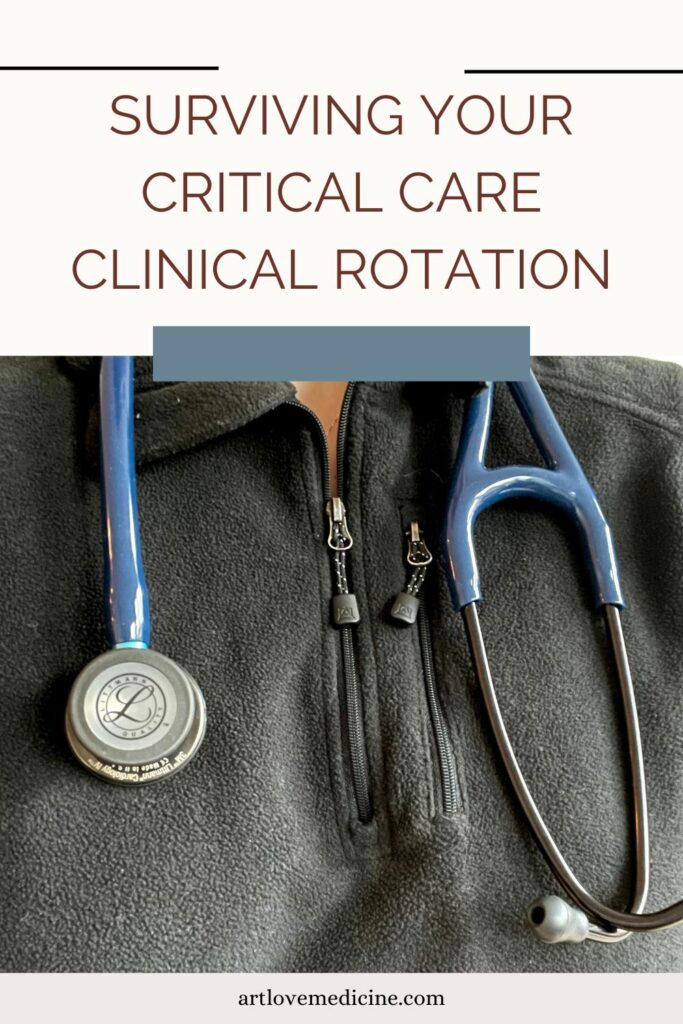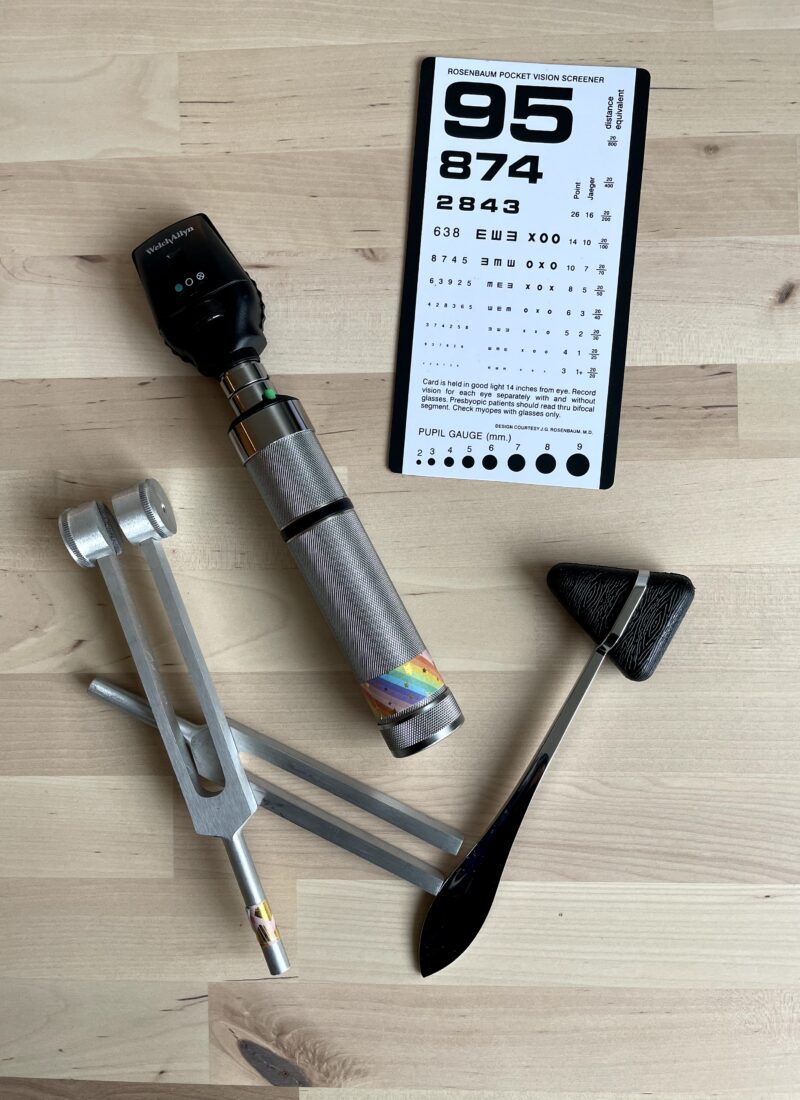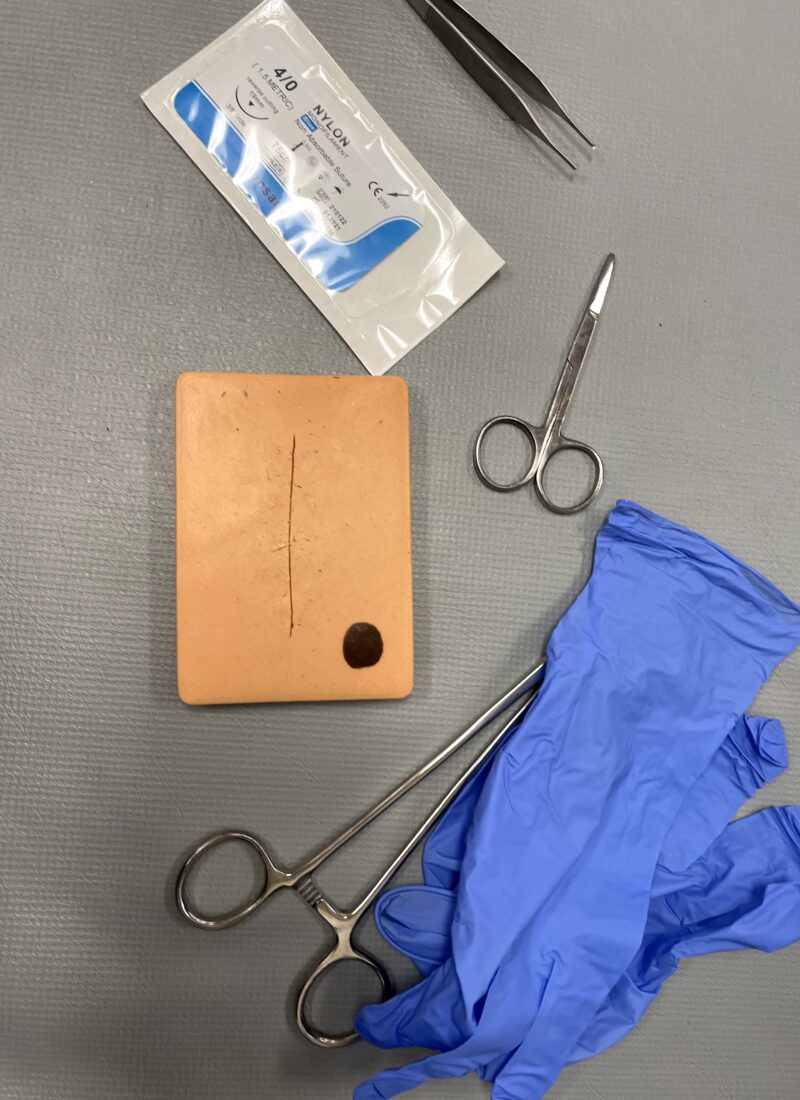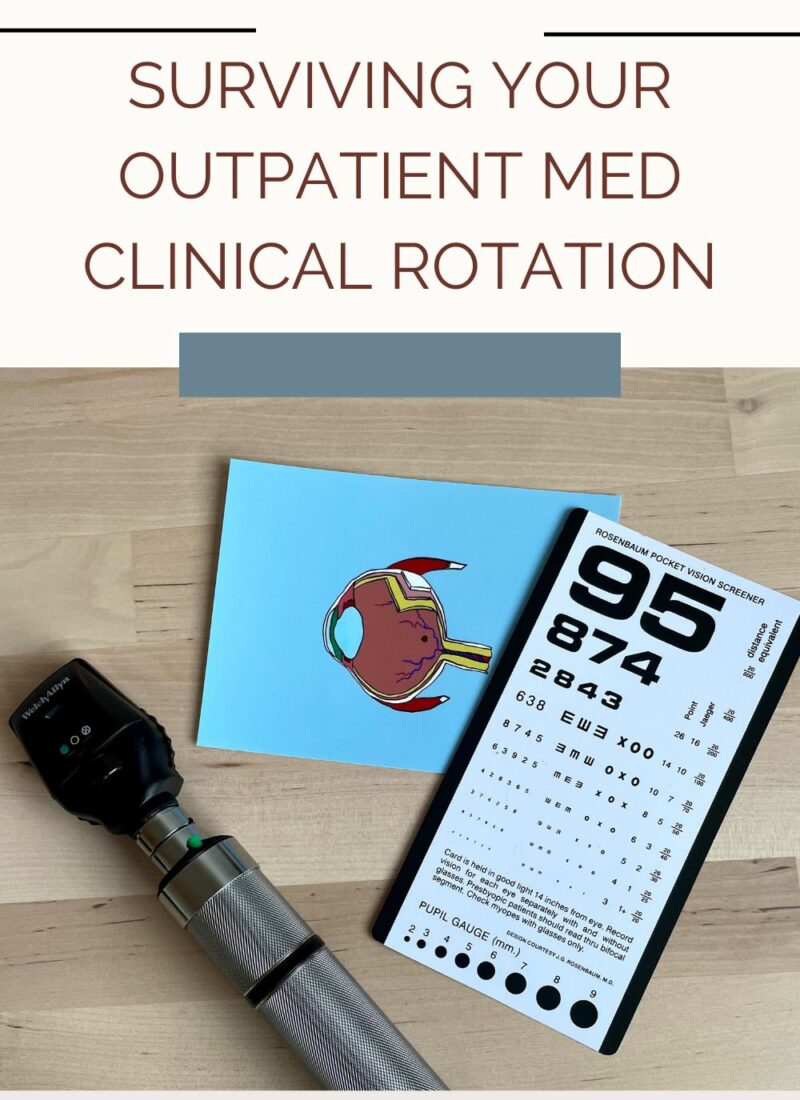There are so many different elective rotations to choose from. There are a lot of different philosophies for choosing elective rotations. You can read more about why I chose Critical Care as one of my rotations in a different post. I ended up doing a Surgical Critical Care elective rotation and I absolutely loved it.
In this blog post, I discuss all the information you need to know to survive (and crush!) your critical care rotation.
***Note: Included in this post are links to some Amazon products. As an Amazon Associate I earn from qualifying purchases (at no extra cost to you), but don’t feel pressured to buy anything! I only include links to products that I have tried or would use myself.
Please note, this is just my personal experience and all opinions and recommendations on this blog are my own. My opinions and recommendations do not reflect the opinions or recommendations of my employers or schools. Nothing in this article is intended as medical advice. I share all this information to share information I wish I would have known prior to my experiences. Everything on the blog is just my opinion and experiences.
My Critical Care Experience
I was in a surgical ICU unit (SICU) at a Level 1 Trauma Hospital. Since the hospital was a trauma center, there were many unique surgical cases in the SICU. There was a lot of head trauma, brain bleeds, open abdomens, MVAs, and struck pedestrians with multiple fractures and bleeds.
I had such a great experience with the team in the SICU and it was an amazing learning experience.
Critical care is intense and there are so many things to learn. When I first started, I felt like I was in way over my head, but by the end of the rotation, I realized I had learned so incredibly much that would help me in any field I end up working in. Because you are constantly reviewing labs, CTs, XRs, and various testing, I feel that this rotation really allowed me to hone in on my skills of determining normal, not normal but not critical, and critical labs or scans. I feel that the rotation helped me to better solidify physiology concepts in a clinical setting since physiological mechanisms are constantly discussed.
In the SICU I was at, I would arrive around 6:30, look at overnight events, and listen to sign out at 7. I would round on my own patients and deep dive into their charts, looking at any new labs or scans. I would attend grand rounds before we then would round on all the SICU patients with the entire team (nurses, physicians, APPS, clinical pharmacist, etc). Rounds would last a few hours depending on the day.
After rounds, we would do any procedures that need done. For example, if a PA was putting a central line, I would help and watch the procedure. Sometime in there we could have lunch or coffee. The afternoons were mostly spend doing any procedures, following up on charts, and seeing any new SICU admits. If there was a code in the ICU or Step-down unit, we would report and help out.
Things to review before the rotation
Heart rhythms
Patients in the ICU are not always stable (hence why they’re in the ICU). Being so, the heart rhythms of all ICU patients are monitored closely. You’ll be looking at rate and rhythm. With varying electrolytes and variable conditions, a patient’s heart rhythm can change even when you don’t expect it. Be able to interpret rhythms and recognize what requires immediate intervention.
Acid-base disorders
Most patients in the ICU have some sort of acid-base disturbance at some point during their stay. Being able to tell the difference between respiratory acidosis and metabolic alkalosis,etc will be so important to managing any critical care patient.
ACLS guidelines
Even if you’re ACLS certified, brushing up on what to do when patients code can be really useful. Depending on the type of ICU you’re in or what hospital you’re at, you may be part of a code. As a student you definitely will not be running any code but knowing what is going on is important in critical situations.
Antibiotics
Antibiotics are not rare in the ICU. Many patients are in the ICU due to infections, but even patients initially in the ICU for reasons other than infection are more susceptible to infections with so many tubes, ports, and wounds.
Ventilators and airways, specifically the basic vent settings like PEEP and FiO2
You aren’t expected to be an expert in ventilators but having an understanding of the terms used when discussing ventilators and other airways such as BiPap and HiFlow would be super useful prior to starting.
Tips for while on rotation
Know Your Patient Well
Whether you’re assigned 1 or 2 patients to present on or you’re expected to know all the patients on the critical care unit, know them well. Pay attention during rounds and look in the charts before and after rounds. Especially know the basics, like if they’re on antibiotics or they have a surgery planned later in the day.
If you’re presenting on a patient, know everything about the patient. Know the labs and trends of the labs, any imaging, any procedures, any consults (and what the consultants say), the vent settings, lines, drips, tubes, and the plan for the patient. At first this may take a lot of time, but you will become more efficient with practice.
Never move a patient without talking to the nurse first (EVD, tubes, lines)
This was something that I didn’t know before coming to the SICU. It can be really dangerous to move patients without notifying the nurse first. Some patients have lines or drains that must be level with the patients head or that cannot be moved for a certain amount of time due to the procedure that was done.
A lot of patients with brain bleeds that had neurosurgery, will have what is called an EVD. When it is open, the EVD must be at the same level as the patients head because it is draining CSF from the brain and is very sensitive to pressure. Critical care nurses are phenomenal and manage all of the lines and drains, so definitely talk to them before considering moving a patient.
Ask Questions (and lots of them)
Likely there is a lot in critical care that you didn’t learn in PA school, so ask questions! Of course there are right times and not so right times to ask questions, decide that for yourself, but find sometime to ask questions. If you don’t know why a certain medication is used over another with the same mechanism, ask. If you don’t understand how the EVD works, ask.
Study things you’re unfamiliar with
Even though you likely don’t have an end of rotation test on critical care (I didn’t), studying when you get home can really help solidify concepts you are encountering in your day-to-day. Studying concepts from the ICU can help you in all areas of medicine, no matter what field you go into. There is a lot of discussion of physiological mechanisms and medication mechanisms of action that even if you don’t plan on working in critical care, you can use what you learn in your practice in the future.
Take notes
During rounds, there will be a lot of things said about each patient’s treatment. Take notes on everything you hear. So many times, I told myself I would remember something, and then I didn’t. If someone gives a good teaching point or mnemonic, write it down so that you can review it later.
Learn from everyone around you
Everyone around you has something that you can learn. This goes in any rotation or experience, but especially in the ICU. Whether it is the doctor, the PA, the clinical pharmacist, the resident, the medical student, the nurse, the CNA, the phlebotomist, XR tech – everyone can teach you something.
Things to have in your pocket in the ICU
List of patients and notes on each
You may get a list at handout, or you may need to write down the names and room numbers before diving into the charts.
Pen
I prefer pens that look a little different so that they are not so easily stolen.
Notebook
Having a small notebook or sheets of paper for notes can be useful to jot down notes during rounds to review later.
Stethoscope
Always good to have. You will use it in some ICUs more than others. It really depends on why your patients are in the ICU in the first place.
Candy or gum
You will be standing a lot and sometimes rounds can go for 4 hours or more depending on where you are. I recommend having a little candy or gum in your pocket or bag as a quick pick-me-up when you have been standing listening for the past 3 hours.
Study materials to Use in the ICU
The ICU Survival Book
This book is super phenomenal in breaking down ICU concepts that I hadn’t learned before or needed to refresh, including ventilator settings, vasopressors, acid-base balance, electrolytes, resuscitation, and more.
Surgicalcriticalcare.net
Onepagericu.com
I hope that this guide to a PA school rotation in the ICU was helpful to you! Is there anything else you want to know about a clinical rotation in critical care that I missed? Let me know any questions that you may have!
Thanks for reading!
-Liz





Leave a Reply